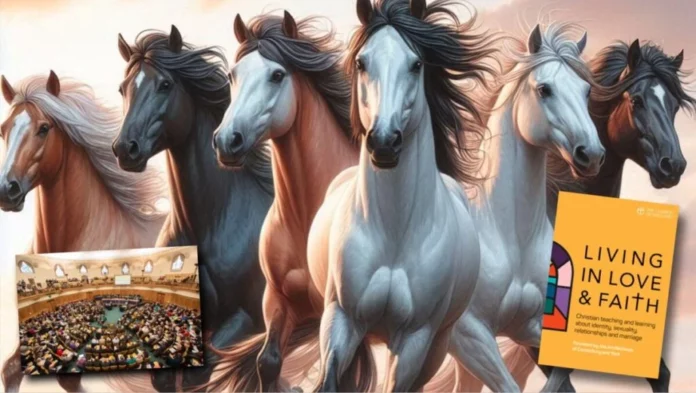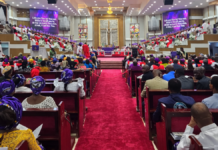Not everything was bad at the session of General Synod last weekend. When someone asked me how I was, I replied ‘I feel like the violinist in the orchestra on the Titanic. The music is going very well!’
There was an important discussion about ‘rest periods for office holders’ (C of E language for vicars taking their days off), a very important debate about the human dignity of disabled children, during which Justin Welby shared that his wife had felt pressured to abort their child, and debates about food banks and the persecuted church. Surprisingly, two potentially incendiary issues—how the inquiry into Mike Pilavachi at Soul Survivor has been handled, and response to the Jay report into our safeguarding strategy—went off more smoothly than they might have done.
But there were three moments that made this session of Synod the most dispiriting that I have experienced in my nearly 15 years attending.
The first was the very clear and thorough presentation by Carl Hughes on national finances and apportionment. (You can watch his presentation by means of the YouTube feed here.)
After presenting the detail of the apportionment (the contributions to be paid by dioceses to central funds), he then set the situation in the context of the wider challenges faced by the Church. This began with the data on attendance, showing that we have halved in size in the last 14 years, and the consequent impact on finances.
Average weekly attendance in every diocese since 2015 is down by between 25% and 40%. More than 20% of our 15,000 churches have weekly attendance of less than 20. In some dioceses parish share is down by over a third since 2019. The number of regular givers has fallen by 30% over the last decade…
And so it continued. Carl also highlighted the decline in the number of ordinands, which as David Goodhew has pointed out has a potentially catastrophic long-term impact.
There are some things to be encouraged about. The Parish Giving Scheme is working well and being used more widely. Important analysis is being completed about diocesan finance. But the overall picture is increasingly unsustainable. The consolidated deficit across the dioceses in 2024 is doubling from last year to a total of £60m.
On the other hand, we have substantial assets in some dioceses and in many churches—though they are very unevenly distributed. There continues to be massive duplication of administrative functions.
Replicating administrative, training, and other functions 42 times is simply an anachronism. Everyone seems to agree with that, but no-one wants to give up the way they do it.
But perhaps the most important thing that Carl said was that ‘Our principal crisis is missional’.
We need to refocus on mission and evangelism, underpinned by prayer for our nation to return to Christ. We need to be teaching that giving is part of Christian discipleship. And we need to work towards a time when today’s ministry is funded by today’s giving.
The second challenging moment was the very insightful report on trust within the Church of England. Curiously, this appears to have been driven by one person, Martin Seeley, the bishop of St Edmondsbury and Ipswich, but assisted by the theologian Professor David Ford, and Professor Veronica Hope Hailey, who presented the report with Martin.
The report was very helpful in being well grounded in theology, and particularly the New Testament. It drew on the work of Teresa Morgan (an Anglican priest, who was a Professor of Classics at the University of Oxford and is now a Professor of Early Christianity at Yale University) on the meaning of pistis in the NT, usually translated ‘faith’, but in the first century having a sense very close to the meaning of our word ‘trust’. (Her work has been influential in academic NT studies—and she happens to be the daughter of my external PhD examiner, Robert Morgan.)
It helpfully highlighted how trust is earned and expressed in organisations.
41. Trust is “the intention to accept vulnerability based on positive expectations of the intentions or behaviours of another” (Rousseau, 1998). People judge the trustworthiness of leaders by four criteria:
• Ability: Have they got the right competencies and abilities to do their job?
• Benevolence: Are they bothered about others or entirely self-interested?
• Integrity: Are they guided in their decisions and actions by a moral code?
• Predictability: Can people see a consistency in their approach?
(Mayer et al, 1995; Dietz and Den Hartog, 2006)
And it was frank about the situation we find ourselves in the Church of England.
8. However, the major and traumatising breaches of trust that have been of deep concern to the General Synod and many, inside and outside the Church, have brought profound and sustained breakdowns of trust into the life of the Church. It is in these areas that distrust is most profoundly evident. Racism, sexual abuse and issues relating to Living in Love and Faith all deeply affect the life and witness of the Church. The major breaches that have occurred have different dynamics but compound people’s suffering through the incidents themselves, and the way the Church may inadequately or inappropriately handle and respond to them.
As I listened to the presentation on Friday afternoon, I was taken by surprise by my unexpected visceral reaction to it. I felt what I could only describe as a sense of grieving in my spirit at the very, very bad situation we find ourselves in the Church of England, where trust is such a rare commodity at so many levels.
This, of course, led to the third challenging ‘moment‘—the various discussions about the Living in Love and Faith process, our debate about sexuality and marriage.
This was not one moment, but several. Apart from the main debate on the Monday afternoon, there was a presentation with questions on Saturday evening, and a fringe meeting on Sunday evening. Each of them was highly revealing of where we are in the discussion. The Trust report set the context perfectly.
42. Research shows that lapses in ability can be forgiven. Each one of us is fallible and human. Most of us in senior leadership roles have made mistakes of competence in our career at some point. Someone has forgiven us that lapse to allow us to continue in our vocation or work. But betrayals of integrity and benevolence can destroy trust, and fast, at both an individual and institutional level (Lewicki, 2017). As an old Dutch proverb puts it: “Trust comes on foot but leaves on horseback.” In other words, trust is hard to gain but all too easy to lose.
The formal proposal before us included the introduction of stand-alone services of blessing of same-sex sexual relationships. It was claimed that this had ’emerged’ from the meetings of the discussion groups convened in Leicester in May—but the paper summarising those discussions for the bishops was not shown to participants, raising suspicions that something was afoot. In answer to Questions, it was claimed that this was an ‘oversight’—yet when I asked Martyn Snow why that paper cannot now be published, he said ‘I don’t see the need.’ Off gallops trust on horseback.
This proposal has been made despite the strong hints from previous legal advice that this would not be possible without a change of doctrine. GS 2328 presented in November 2023 included in Annex A, para 17, the comment that:
it would be difficult to say that making the PLF available for same-sex couples without there being an assumption as to their sexual relationships was not indicative of any departure from the Church’s doctrine.
The reason for this is that, as Questions have confirmed, the legal position remains what it was in 2017. In the paper tabled by the House of Bishops, which by the narrowest of margins was not ‘taken note of’ in the House of Laity, the legal advice was published and was unambiguous. Any stand-alone service would have to include clear explanation of the Church of England’s doctrine of marriage, would need to make it clear that what was happening in such a service was not marriage, and in fact was contrary to the Church’s teaching. Such a service would be unusable. (You can read the paper here, including the legal advice in the appendix, and explore all the debates about legal advice here.)
Can we see the legal advice? Martyn Snow was asked again. ‘No, I don’t see the need’. Another horse gallops away.
In Questions, it was asked whether the new approach to openness and transparency that Martyn had promised would mean the House of Bishops publishing minutes of past meetings. No, this will only affect future meetings. The stable is now beginning to look pretty empty.
The presentation and questions session on LLF did actually offer some greater honesty. The group of three bishops were asked: if the stand-alone services of blessing were to be made available for a ‘trial period’, if it was decided that they should not continue, what mechanism was there for withdrawing them. (None exists in canon law.) ‘To be honest, I don’t see them ever being withdrawn’. So now we know: this ‘trial’ would actually be a permanent change.
And Sam Corley, bishop of Stockport, helpfully added further clarity. If clergy are blessing a relationship, then there is a ‘theological gap to be closed’ if they are blessing something they themselves cannot enjoy. In other words, you cannot sustainably offer stand-alone blessings without then allowing clergy to enter same-sex sexual relationships with the ‘blessing’ of the Church. At last we have some clarity—but what happened to the emphatic claims made in February 2023 that any prayer ‘was not blessing the relationship but only the people’? I am now hearing the very distant sound of hoofbeats.
All this provoked Michael Beasley, the normally calm and reasonable Bishop of Bath and Wells, to ask Martyn: ‘When did we as a House ever discuss whether stand-alone services would not be indicative of a change of doctrine?’ I understand that he also asked this of his fellow bishops by message—but answer came there none.
Perhaps the stable of trust has been empty for a long time. The horses seem to have disappeared over the horizon.
Even in the debate we could not trust what was being said. Justin Welby claimed that ‘he could not imagine a Church without the members of the Alliance being part of it.’ And yet those very people had just told him that passing this motion would exclude them, as it was setting out a plan to introduce a de facto change in doctrine—as the question session had made clear. How do you respond when you tell someone ‘Voting for this will exclude me’ and the person responds ‘I don’t want to exclude you, but I am still going to vote for it’?
The reason why this question of trust, and the clear dishonesty of the bishops pressing for change, is so important was set out starkly in the Trust paper. Quite apart from the disaster this is in any organisation, trust, or faith, pistis is absolutely at the heart of the Christian life. It is by the pistis of Christ that we are saved. And trusting him, having been reconciled to him, we trust and are reconciled to others. When this is absent amongst the leaders of God’s people it raises the most basic question of where we stand before God.
The problem here was most eloquently expressed in speeches by two lay women.
Helen Lamb has joined Synod after a by-election in Oxford Diocese, ironically filling the vacancy left by the departure of campaigner Jayne Ozanne. Without appearing to refer to notes, she talked of the LLF bus running over those who did not agree with the direction of travel.
…one of the most dismaying things was to hear the lead Bishop for LLF say he hopes that there will be space in the Church of England. Synod, I believe and continue to believe the current teaching and doctrine of the Church of England in common with anglicans around the world and the Church of England down history. And the bishops hope that there will be space.
The destination has been made clear. The bus is traveling, the route stops are mapped out—but it is going in one direction. That has been made explicitly clear. And right now it feels like some of us are being run over by that bus.
I also hear that for some people it is going far too slowly. I believe you when you say that that the paper talks of respecting our integrities. I take it that doesn’t mean we’re going to pretend that we’re all really right, even though some of us believe mutually exclusive things. I take it it means that we believe when we say something that we mean what we say. So I hear people say this is too slow. I believe you. I believe that’s what you think and I know this is a matter of justice and of love and of inclusion for you.
Please believe me when I say it is a matter of obedience to God, of conviction that that is teaching that marriage is given to teach us something about Jesus and his bride. So please take us at our word that we’re not obstructing or delaying or playing games. We are seeking to obey God above all. And so our disagreements are profound and they matter profoundly to all of us.
It is heartening therefore to hear talk of we want to listen and this is where I declare is it an interest. I signed the Alliance letter. I didn’t do it because I was coerced and I certainly didn’t coerce anyone else. I signed it with a heavy heart and in deep lament. We are in a grievous situation. But I signed it because I am hopeful that there can be a space where we can all flourish and I am pleading with the bishops to work with us. I signed it to be part of creating a space.
And to hear that the power that the Bishops hold as ordinaries is non-negotiable whereas the doctrine of the Church is negotiable is a hard thing to hear from our bishops. We know there’s a trust deficit. That debate on Friday was in some ways interesting and helpful in diagnosing the problem. But it hasn’t offered much of a plan.
So thank you for words of wanting to listen, of wanting to engage. I recognize you’re asking that of all of us no matter which side our convictions are coming from. But I’m afraid I’ll believe it when I see it.
And in the meantime we will continue to work to do what we believe we have to do to obey God to trust him to take him at his word to be in fellowship with one another wherever we can. We want to stay on the bus; please don’t run us over the church is the Bride of Christ.
I love this church. It has been my spiritual home, and I’m part of the Church of England. So please let’s find a space where we can all flourish. Don’t run us over.
Laura Oliver is a GP in Blackburn and a lay member for that diocese, and she eloquently expressed how, as a gay person who upholds the Church’s understanding of marriage according to the teaching of Jesus, she feels that this motion offers her no space in the Church.
Read it all in Psephizo








… [Trackback]
[…] Read More Infos here: anglican.ink/2024/07/12/where-does-the-c-of-e-go-on-sexuality-after-july-synod/ […]